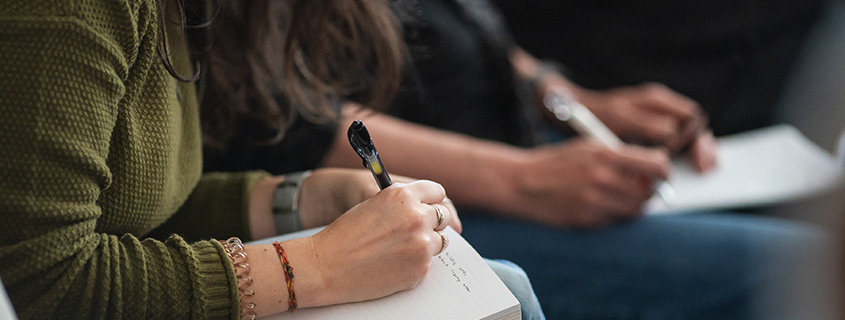
Editor's Note: In 2021, the Writing to be Free program served nearly 200 women. During these informal workshops for people transitioning out of incarceration, professional writers guide participants in giving voice to their story.
“Lock up the libraries if you like, but there is no gate, no lock, no bolt that you can set upon the freedom of my mind.” Virginia Woolf
I think we were working on a how-to poem that day, as in “How to Be Perfect,” by Ron Padgett. We discussed his opening advice to “Get some sleep," and his parting advice, “When there’s a shooting in the street, don’t go near the window.”
We brainstormed all the ways instructions do and don’t work. We talked about clarity and explicit language. In a class Lighthouse sponsors called “Writing to Be Free,” we talked about how to be beautiful, how to be vulnerable, how to be sober, how to be free.
Because Writing to Be Free participants are in a community corrections facility, we meet in a small room, with a single window of safety glass, monitored by cameras. Because of COVID protocols, we wear masks. We talk about what freedom means, what recovery means. We are keen on definitions.
In a how-to poem about sobriety, one student read a line about coping, something like, “learn coping mechanisms to deal with problems so you don’t choose drugs instead.”
“What does that mean, to you, to cope?” I asked. What does “cope” mean?
The class tossed out a few examples and ideas about coping mechanisms. Most associated the word “cope” with something soothing, with comfort.
We looked it up.
“Cope” descends from the Greek colaphos, “to blow with a fist,” and finds its way into Middle English as “meet in battle, come to blows.”
The room was quiet for a second and then, “Wow!” “Tough!”
The state of Colorado sits just above the national average for the number of women in incarceration per 100,000. According to the website for the nonprofit The Reentry Initiative, clinician and researcher Stephanie Covington states, “Women’s most common pathways to crime are based on survival of abuse, poverty and the combination of substance abuse and mental illness.”
The women I meet in our Lighthouse class define freedom through the lens of incarceration and addiction. They are doing battle. We meet a couple of times per month and write together, read poems, share work, and talk about language. Writing is a coping mechanism, a strategy to consciously engage their minds in the work of recovery.
In their words:
“It helps me be insightful and creative."
“I never liked writing or putting anything about my life on paper, and this group … has opened a new creative side of me.”
“Being able to help define myself and help me find my purpose and something to be grateful for."
A graduate of Regis University’s Mile High MFA program, Melanie Merle chose an emphasis in poetry and non-fiction, though she enjoys writing across genres. Most recently, she put her skills to work for her tribe. As a production writer for the Chickasaw Nation, Melanie worked on various projects for social media, virtual presentations, and internal communications, but is most proud of the work she did on a video for a National Parks Grant and a collection of mini features for the Chickasaw Hall of Fame. Melanie is an Assistant Editor for the literary and art journal Inverted Syntax, has worked with Indie filmmakers for the 48-hour Film Project, and works as both a writer and a teacher for Cherry Blossom Yoga.
Having spent time in Tulsa teaching both yoga and creative writing through the Women In Recovery Program, part of Tulsa’s Family & Children’s Services, Melanie is happy to join the Lighthouse faculty and serve the Writing to Be Free community.

